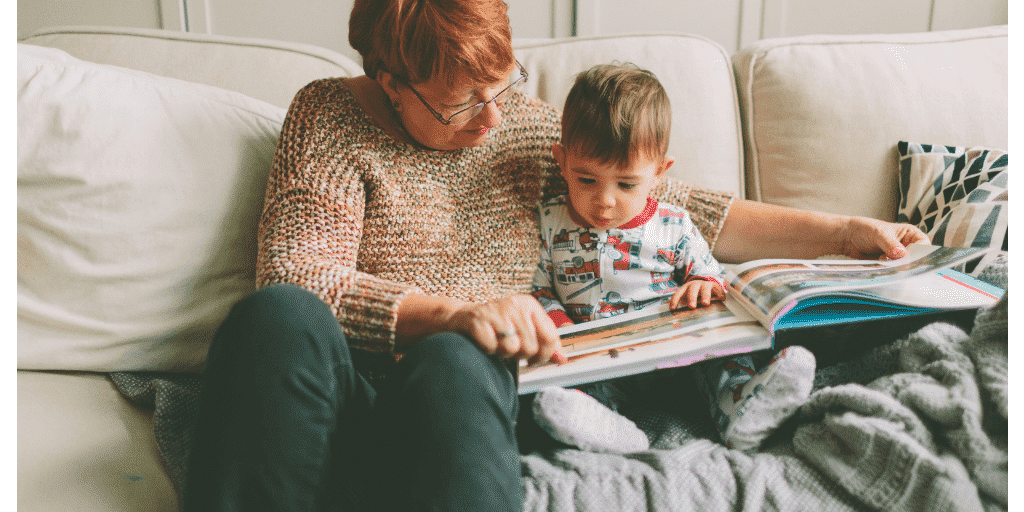 We know that grandparents can make a huge difference in the lives of their grandchildren. They can be another ear to listen. A teacher, a carer. Someone to share different ideas and viewpoints. They can be a key source of love in a secure support network for a child as they grow.
We know that grandparents can make a huge difference in the lives of their grandchildren. They can be another ear to listen. A teacher, a carer. Someone to share different ideas and viewpoints. They can be a key source of love in a secure support network for a child as they grow.
But grandparenting is a lot more than childcare. Often overlooked is the support that a grandparent can be for the parents of their grandchildren.
Supporting The Parents of Grandchildren Can Be Hard
However, it is here that grandparenting can get sticky. Should we offer our grandchildren's parents advice, and if so, how? What if we do not agree with their methods of discipline or their policies on screen time? Do we need to have a say about bedtime or snacks, or just muddle through quietly without a word?
Becoming a grandparent can spark many big feelings. We may not stop to recollect the tough times from our own childhoods, yet shimmers of stored feelings from our own childhood experiences may color our time and our relationships with our grandchildren and their parents. We may all too vividly recall the parental exhaustion, the fights over dinner, or our difficulties setting limits in our own parenting. These stored feelings can sometimes get in the way of us being the loving and positive influence we want to be.
How to be the Grandparent You Want to Be
Patty Wipfler, founder of Hand in Hand Parenting, is a doting grandmother to three grandchildren, now teenagers. Here Patty shares why being the grandparent you want to be starts not so much with grandchildren, but with the parents of the grandchildren.
What's one thing you wish someone had told you about being a grandparent?
I think the most important thing, and the hardest thing, for grandparents to do is to refrain from offering advice until we're asked. We might have helpful information, useful ideas, but unless our sons, sons-in-law, daughters, and daughters-in-law ask for our thoughts, they're not ready for our input, and our attempts to help will feel, sadly, like criticism to them. I think that the second most important thing I’ve learned is to spend as much time and attention on our relationships with our grown children and their partners as we do on our grandchildren.
Why have you found allocating that time and attention so worthwhile?
Well, we know firsthand that parenting is hard. It is work that is not often openly appreciated and it makes a real difference for that effort to be noticed. We can be the ones to notice what they do well or how hard they try, we can notice the stresses and strains on them, and find little ways to let them know that we “see” them and that we and appreciate them and the monumental job they're doing.
If we can care for our grandchildren on a regular basis, paying attention to our children's instructions about the details they feel are important, great. If we can cook meals for our children’s families on a regular basis, great. If we can fold their laundry, wash their dishes, do a shopping, lift the drudgery even a little bit, we can make life sweeter for them and their children.
But it’s just as important to take time one-on-one with the parent –a walk, a cup of tea, a fun trip to that new bakery in town to see what they have–and listening to them in the process, with interest, and without advice, unless it's requested. I see this as a form of unannounced Special Time, and it helps our children, the parents of our grandchildren, feel respected, valued, and nourished.
So, as parents, we never really stop doing Special Time with our children?
That's right!
Why do we tend, as grandparents, to connect the role as having more to do with the grandchildren?
We tend to feel more hopeful about our relationships with our grandchildren than we do about our relationships with our children. Having a fresh chance to create loving relationships from the start makes allows us to feel hopeful. However, though our children don’t run to embrace us enthusiastically any longer, their hearts are still tender, and they still need us to shine our love on them! As parents, they work so hard, and so few simple acts of nurture come their way! We can help to correct that imbalance by remembering that they may be grown now, but they’re just as important, and just as loveable, as they were when we could easily hold them in our arms.
Cleaning up our own discomforts and leftover issues with our children and their partners is vital. It will help us build trust, help us be supportive, and help us continue to improve our relationships with our children and their significant others. And this will make our grandchildren's lives better, for sure.
Parents need to feel loved and supported in order to do their best with their children. We can be a significant source of love and support to our grandchildren's parents, and exactly how we can do that is up to us to figure out.
What can we do if we have difficulties getting on with our children or in-laws, or if we have feelings about the way they are raising their children?
Working on the tensions, old and new, in the relationships with our children, is important. We don't want to walk in the door, make a beeline for the little ones, and silently communicate to our own children and their partners that the children are the apple of our eye, and they, not so much! We highly recommend regular Listening Partnerships for grandparents. With a listener, we grandparents have the chance to notice any negative feelings or judgment we silently carry in our minds and have a good cry or a good laugh about the sticky feelings that cloud our joy as we try to offer our support. Our children and their partners can’t benefit from our goodwill if it comes mixed with negative feelings about them and how they parent. It’s our job to find a place to express these feelings, and then to think about our children’s struggles as parents, and what each of them would find supportive. To be open to our ideas, they first have to know that they are loved!
Can you share some of the ways you've moved your attention to the parents of your own grandchildren?
One of my sons and his family live close by, and my husband and I have been quite involved in their lives. We’ve adopted the tradition of cooking Sunday dinner for them weekly. I don't love to cook but I decided I want to support my daughter-in-law by doing something that communicates “You're special” to her because as a woman, I know the burden of having to come up with meals three times a day for years and years and years and years!
She, in turn, is openly happy to sit down, in the warmth of our home, to a meal she didn't cook. We all get to relax together once a week. My grandchildren often wrestle with one another or their parents on the living room carpet after dinner. This tradition has been a surprisingly strong expression of love and caring, somehow.
 For others, good ways to show support might be entirely different. The overarching idea is to make a commitment to be there in some way because parenting is an enormous task and you know it! We want to find ways to show our support that our children and their partners can feel, so our love can reach their hearts.
For others, good ways to show support might be entirely different. The overarching idea is to make a commitment to be there in some way because parenting is an enormous task and you know it! We want to find ways to show our support that our children and their partners can feel, so our love can reach their hearts.
What about families who don't have their grandchildren nearby?
There are many ways to stay in touch! I know grandparents who are quite creative on this score! Some plan a yearly visit. Some set up an annual family reunion. Phone calls are great. One grandparent I know Skypes often with her grandchildren, who live on the other side of the world. She gives them Special Time by Skype, with her son or her daughter-in-law holding the laptop so her grandchildren can show her what they like to play, and she can pay 100% attention via Skype, moving throughout the house or outside, as the grandchild dictated. I have done this too–it's surprisingly effective!
When my other son and his family lived on the other side of the US and their son was born, I made a commitment to see them four times a year, coming to them twice, and making sure they could afford to come to us twice each year. This commitment was an important one. We've modified it over the years as our circumstances have changed. I've also bought plane tickets yearly so my son’s dad, my ex, could fly to visit them. I wanted to support their relationship when and where I could.
What advice do you have for grandparents about being a support – or getting their own?
I think we grandparents need a lot of help cleaning up our feelings about the things that didn't go well in our parenting. We didn't get enough support; we have regrets; our children have resentments; these things create a distance that we didn’t ask for, and don’t want.
Releasing feelings about our parenting journeys on a regular basis helps us relax and think clearly about when and how to support younger generations well.
Read 16 Questions You Can Use To Help Heal Family Tensions
For more on Grandparenting, read Being a Supportive Grandparent
You can learn about and begin using the Listening Partnerships tool that Patty mentions to work through and release feelings with this online class, Building a Listening Partnership: Easing the Stress of Parenting

